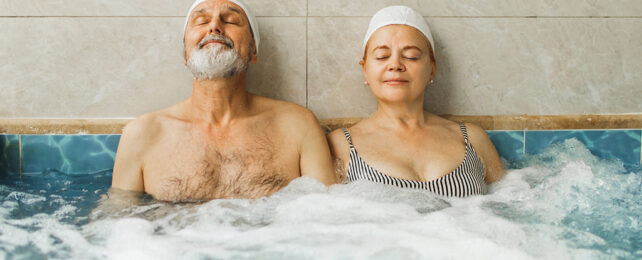A friend of mine recently lost her security deposit at the holiday home she and her fellow hens were renting for a weekend. Why? Well, she dropped a microwaveable lasagne into the hot tub.
Could happen to anyone.
Despite trying their hardest to sieve out all the bits of minced beef and curdled white sauce that bubbled up to the surface, it was all in vain. The damage was done.
A stray lasagne might be the least of your holiday hot tub worries, though.
There may be a host of other nasties lurking invisibly in the water. Despite the potential wellbeing benefits of heat and hydrotherapy, enjoying a relaxing dip in the hotel hot tub could do more harm than good.
Hot tub lung
For example, it's possible to contract a respiratory condition, colloquially referred to as hot-tub lung.
It's triggered by microbes called mycobacteria, from the same family as those which cause the infection tuberculosis (TB).
Like in TB, hot-tub lung bacteria generate patches of inflammation in the lung tissue. This results in symptoms such as shortness of breath, cough and fever. The lung changes can be seen on an X-ray or CT scan of the chest, and may appear quite profound.
The hot tub acts as a perfect environment for the growth of these bacteria because the warmth of the system creates an optimum temperature for their proliferation. The bubbling of the water also acts as an aerosol – allowing the bacteria to be released into the air, where they can be inhaled.
Unlike TB, which requires long-term antibiotics and is becoming increasingly difficult to treat, hot tub lung may be considered more of an inflammatory condition.
Hot-tub lung was classified fairly recently, in comparison to other lung diseases, and was first described in 1997. It is more likely to be associated with frequent hot tubs users, or those with compromised immunity.
Waterborne bugs
There are many other organisms that can flourish in hot-tub machinery.
These include legionella, the bacteria which cause the potentially severe infective disorder, Legionnaire's disease.

Legionella's breeding grounds are not just limited to hot tubs either. It is naturally found in fresh water and grows particularly well in water which is heated to warm temperatures. So, showers, swimming pools and air conditioning units may also pose risks.
The symptoms of Legionnaire's disease are much like those of other respiratory infections, including shortness of breath and a dry or phlegmy cough. But it's common to get other complaints such as muscle aches and headaches too. Hospital treatment may be required, and antibiotics should be prescribed.
It's not just the lungs that can be affected by water-borne bacteria. Bacteria in hot tubs can trigger infections of the skin, such as hot tub folliculitis, which may occur in outbreak clusters.

Hot tubs can also trigger infections in the eye, particularly if wearing contact lenses. So it's advisable to remove them before getting in.
Reaping the benefits
If you avoid the bacteria, hot tubs may have some positive effects on health and wellbeing.
It's possible, for example, that heat therapy could generate the production of so-called "heat-shock" proteins, which have the ability to impact metabolism. Human trials have found that these proteins could influence the body's sensitivity to insulin and the laying down of fatty tissue, therefore acting as natural treatments for diabetes and obesity.
The potentially restorative properties of simple immersion in water, both heated or cooled, are well documented. Water acts as a medium to deliver either heat, but also cold temperatures, sometimes to the extreme.
Cold water immersion (CWI) has garnered a lot of attention, and purpose built cold tubs are making more appearances. Alongside potential benefits – including rapid healing and recovery, mood enhancement and improved immunity – are grave risks. These can include drowning and fatal cardiac arrhythmias, triggered by the extreme cold. There's no medical consensus, however, on whether CWI's benefits outweigh its risks.
Exercising in water, the branch of alternative medicine known as hydrotherapy, has been proposed as a holistic technique to treat a myriad of conditions. These range from high blood pressure to cancer. While the jury is still out on the overall effectiveness of this method, some patients have reported improved energy levels and mood, as well as reduced anxiety and pain.
So, the next time you're thinking of retiring to the hot tub with a glass of champagne, consider what you might be stepping into.
Make sure, at least, that the tub has been properly maintained and cleaned. But be aware that chlorine doesn't kill all the nasty stuff like legionella.
Whatever you do, make sure you pop out your contact lenses – and never, ever take a lasagne into a hot tub.![]()
Dan Baumgardt, Senior Lecturer, School of Physiology, Pharmacology and Neuroscience, University of Bristol
This article is republished from The Conversation under a Creative Commons license. Read the original article.
